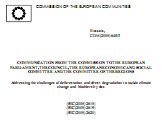European Commission says ‘no’ to forest credits in the ETS until after 2020, cites ‘market flooding’ and governance problems
-----------------
The European Commission will tomorrow state that it is opposed to the inclusion of forest-based carbon credits in the ETS, in a wide-ranging Communication on deforestation and how the European community plans to deal with it. The Communication will say that the aim should be to reduce deforestation by 2020 and halt it by 2030.
This will probably be broadly welcomed by independent organisations campaigning for the protection of forests worldwide, though it will no doubt disappoint the growing number of individuals, companies and some conservation organisations that are already speculating in forest-based ‘carbon assets’.
Much of the reasoning included in the Communication will be widely supported. Summarising its opposition to inclusion of forests in the ETS, the Commission will argue that “Recognition of forestry credits in the EU emissions trading system (ETS) would not be realistic at the present time. Emissions from deforestation are roughly three times higher than the amount of emissions regulated under the EU ETS. As the EU ETS is currently the only major operational trading system in the world, allowing companies to buy avoided deforestation credits would result in serious imbalances between supply and demand in the scheme. There are also unresolved monitoring, reporting, verification and liability questions. Forestry credits are temporary and will then have to be replaced after a certain period.”
The Commission will go on to say that “Inclusion of forestry credits in the EU ETS should only be considered after a thorough review of the experience of using deforestation credits for government compliance and for the period after 2020.”
The Commission will also rightly emphasise the need to address the underlying problems of deforestation, saying that “The most important underlying cause is ineffective governance, linked to poorly enforced land-use policies and uncertain land-tenure regimes. To be effective any global approach to deforestation will have to address these drivers directly…strengthening forest governance and institutions at a local and national level is a precondition for any effective policy response.”
As many environmental organisations have been arguing, the Commission will also recognise the need to address consumption of products leading to deforestation, stating that “a comprehensive policy on deforestation cannot disregard the demand side and the responsibility of consumers“. Noting the lack of reliable information on deforestation and forest carbon flows, the Commission will note that “if policy is to be designed and implemented properly, it must be based on high-quality information. Existing forest monitoring and assessment programmes are neither complete nor integrated.”
Pointing to the dangers of focusing solely on forest carbon, the Commission will note that “Full reliance on carbon value would focus solely on the services of forests as carbon stock, while not rewarding other important services that forest ecosystems provide and whose value can be significantly. This is an issue that will also have to be resolved.”
As most major European environmental organisations have been arguing, the Commission will advocate that, for the foreseeable future, public funding instead of carbon markets should be used to finance avoided deforestation efforts, focusing in the short term on addressing governance and tenure problems: “A Global Forest Carbon Mechanism (GFCM) should be established….It should require that effective forest governance structures are in place, and that the rights of forest dependent people are respected…Public funding is the most appropriate way to take forward a number of essential activities – in particular capacity building, technical support for forest governance and developing the necessary technical know-how to monitor and enforce commitments. Public funding is also the most realistic tool with which to provide incentives for combating deforestation over the period 2013 to 2020.”
The Commission will argue for the use of funds from the auctioning of ETS allowances to generate money for efforts to avoid deforestation: “under the proposed amendment of the ETS Directive of January 2008, at least 20% of auction proceeds should be used to support climate objectives, including fighting deforestation…If 5% of the auctioning revenue was earmarked to contribute to global efforts to combat deforestation, 1.5-2.5 billion euros could be raised in 2020.”
Attention will now focus on what happens next to European policy on REDD. Environmentalists will no doubt hope that the broad conclusions of the Commission’s Communication will strongly guide its position at Poznan and thereafter. The Commission has committed to organising a conference in 2009 in order to provide a forum for discussion of the Commission’s proposed negotiating mandate for Copenhagen, which will be published in early 2009.
---------------


